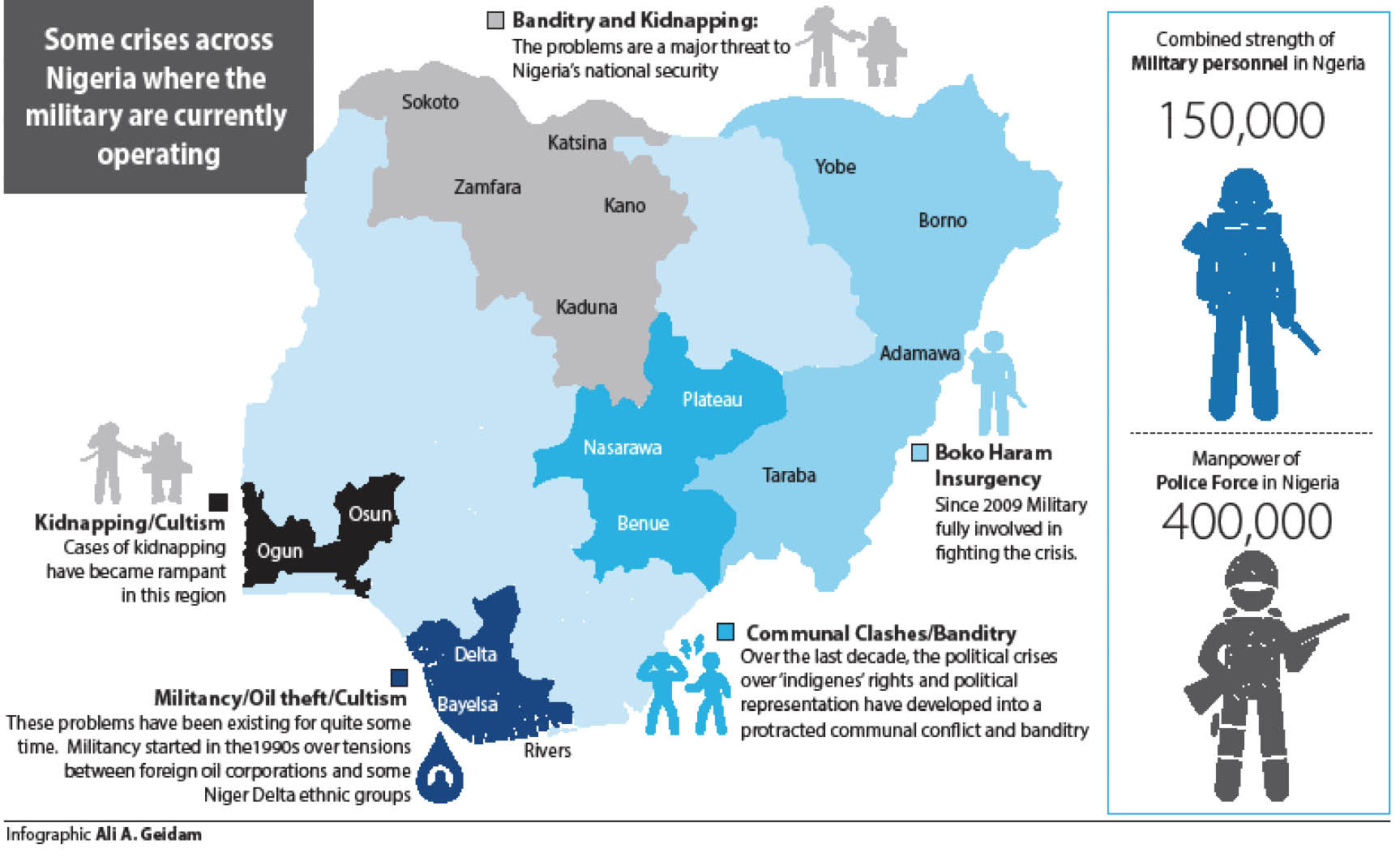Military set to withdraw from volatile areas
Nigeria not at war – Naval chief The Nigerian military will from the first quarter of 2020 begin gradual withdrawal of its forces deployed to some volatile areas across the country, the Chief of Naval Staff, Vice Admiral Ibok-Ete Ibas, said yesterday. He stated this while fielding questions from newsmen at the Presidential Villa, Abuja, […]

- Nigeria not at war – Naval chief
The Nigerian military will from the first quarter of 2020 begin gradual withdrawal of its forces deployed to some volatile areas across the country, the Chief of Naval Staff, Vice Admiral Ibok-Ete Ibas, said yesterday.
He stated this while fielding questions from newsmen at the Presidential Villa, Abuja, after a Security Council Meeting with President Muhammadu Buhari, explaining that the move is to pave way for the police to take full charge of internal security.
Ibok-Ete Ibas said the gradual withdrawal of troops will also enable the military focus attention on other emerging threats and areas of concern.
The meeting was attended by the Chief of Defence Staff, General Gabriel Olonisakin; Chief of Air Staff, Air Marshall Abubakar Sadique; Chief of Defence Intelligence, AVM Mohammed Usman and the Director General of Department for State Service (DSS), Yusuf Magaji Bichi.
Others at the meeting were the National Security Adviser (NSA), Babagana Monguno; Secretary to the Government of the Federation (SGF), Boss Mustapha; and the Nigerian Army Chief of Policy and Plans, Lieutenant General Lasisi Adeosun, who represented the Chief of Army Staff, Lt. Gen. Tukur Buratai.
Our correspondents report that the Army, Navy and Air Force have in the last 10 years deployed thousands of their personnel to restore peace and order, especially in the North-east where the police, civil defence, customs, immigration and other security agencies were reportedly overwhelmed.
Daily Trust reports that besides confronting the Boko Haram and ISWAP in the North-east, the armed forces are involved in different operations in other parts of the country to quell kidnapping, banditry, farmers/herders’ conflicts, communal clashes and militancy.
Nigeria, alongside Chad, Niger and Cameroon, is confronting Boko Haram in the North East under the multi-National joint task force.
Similarly, there are thousands of Internally Displaced Persons (IDPs) living in camps across the country who could not go back to their communities because of absence of civil authorities.
While fielding questions from State House Correspondents after the security meeting, the naval chief said the withdrawal of troops will be done after an “assessment” to determine areas where peace has returned to enable civil authorities to assume full control.
“It is the work of the police to handle internal security since Nigeria is not at war,” Ibok-Ete Ibas stated.
“Basically, most of the internal security issues that we are having, as you are all aware, are supposed to be the responsibility of the civil authority, the police in particular.
“In the circumstances that the military has to come in to stabilise the situation, it is only proper that once one area has been dominated by the military and the situation has returned to normal, that the Nigeria police take over the responsibility. And in this instance, we also have the civil defence which is supposed to support the police in this regard.
“You will recall also that Mr President recently approved the recruitment of about 10,000 Nigerians into the Nigeria Police Force, hoping that once these Nigerians get the appropriate training, they will be in the position to fill the gaps.
“You are aware that Nigeria is such a big country that we cannot tie down the military even in those areas that the deliverables have been achieved and the objectives achieved,” he said.
